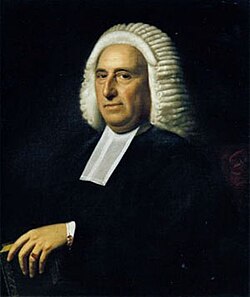This is an old revision of this page, as edited by RjwilmsiBot (talk | contribs) at 02:10, 21 November 2010 (Adding Persondata using AWB (7393)). The present address (URL) is a permanent link to this revision, which may differ significantly from the current revision.
Revision as of 02:10, 21 November 2010 by RjwilmsiBot (talk | contribs) (Adding Persondata using AWB (7393))(diff) ← Previous revision | Latest revision (diff) | Newer revision → (diff)- Not to be confused with his son Mather Byles (loyalist)
| This article does not cite any sources. Please help improve this article by adding citations to reliable sources. Unsourced material may be challenged and removed. Find sources: "Mather Byles" – news · newspapers · books · scholar · JSTOR (June 2007) (Learn how and when to remove this message) |

Mather Byles (b. 26 March 1706, Boston, Massachusetts – 5 July 1788), was a clergyman active in British North America.
He was descended, on his mother's side, from John Cotton and Richard Mather. He graduated at Harvard University in 1725, and in 1733 became pastor of the Hollis Street Church (Congregational), Boston. He held a high rank among the clergy of the province and was noted for his scholarly sermons and his ready wit.
At the outbreak of the War of Independence he was outspoken in his advocacy of the royal cause, and after the British evacuation of Boston his connection with his church was dissolved.
He remained in Boston, however, and subsequently (1777) was arrested, tried and sentenced to deportation. This sentence was later changed to imprisonment in his own house. He was soon released, but never resumed his pastorate.
He is known for saying "Which is better - to be ruled by one tyrant three thousand miles away or by three thousand tyrants one mile away?". A variation of the quote is spoken by Mel Gibson in the The Patriot.
He died in Boston on 5 July 1788, aged 82.
Besides many sermons he published A Poem on the Death of George I (1727) and Miscellaneous Poems (1744).
![]() This article incorporates text from a publication now in the public domain: Chisholm, Hugh, ed. (1911). Encyclopædia Britannica (11th ed.). Cambridge University Press.
This article incorporates text from a publication now in the public domain: Chisholm, Hugh, ed. (1911). Encyclopædia Britannica (11th ed.). Cambridge University Press. {{cite encyclopedia}}: Missing or empty |title= (help)